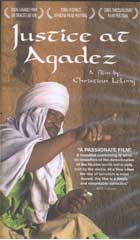
Justice at Agadez 2005
Distributed by First Run/Icarus Films, 32 Court St., 21st Floor, Brooklyn, NY 11201; 800-876-1710
Produced by Christian LeLong
Directed by Christian LeLong
VHS, color, 78 min.
Adult
African Studies, Law, Religious Studies
Date Entered: 07/28/2006
Reviewed by Douglas Reed, Department of Political Science, Ouachita Baptist University, Arkadelphia, ARJustice at Agadez reveals an approach to legal arbitration that rivals the harsh fundamentalist label often associated with Muslim law.
Set in Agadez, a small village in northern Niger, the film presents seven cases mediated by the local Islamic judge, or Cadi. The grievances range from domestic disputes and witchcraft to theft and financial disagreements. The opening narration establishes the Cadi’s functional role as an agent of negotiation and civility. The filming is inconspicuous, providing a first-hand perspective of each proceeding.
Justice at Agadez depicts the Cadi as an even-handed adjudicator who respects the rights of both men and women. Both sides are permitted to speak freely before the Cadi interjects his opinion. In several of the cases, the Cadi effectively diffuses conflict by adjourning before making a judgment so both parties can reflect on the issues and return at a later date. One of the documentary’s weaknesses is that occasionally during heated exchanges, the subtitles make it difficult to identify who is speaking. Another drawback is the film does not clarify the situations that are turned over to formal authority. For example, in a dispute over family property, the Cadi pronounces that the conflict will not go any further in the justice system. By contrast, a claim involving failure to pay an employee is referred to the police.
Overall, viewers will appreciate the film’s insight into Islamic law. Moreover, it is a unique opportunity to observe the practical implications of these religious practices in individuals’ daily lives.
Justice at Agadez was among entries at the 2005 Grand Prix de Traces de Vie; 2005 Thessaloniki International Film Festival; 2005 FESPACO African Film Festival; 2005 Kampala International Film Festival; 2006 Freiburg International Film Festival; and 2006 One World International Film Festival.
Recommended for college and university libraries.